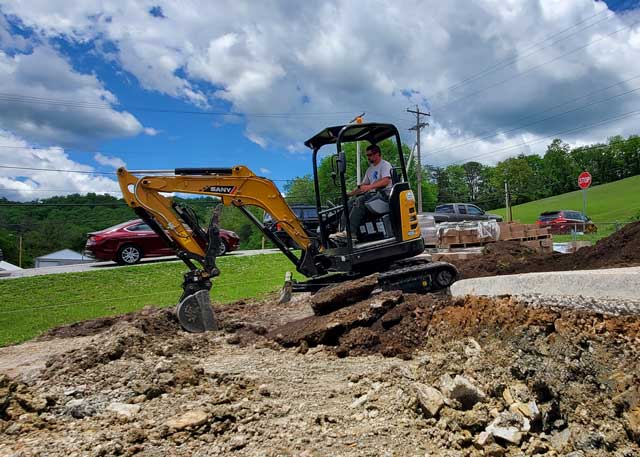Septic Ohio - Comprehensive Septic Tank Solutions in Ohio
Septic Ohio - Comprehensive Septic Tank Solutions in Ohio
Blog Article
Comprehensive Excavation Strategies: Grasping the Basics for Success
The mindful preparation, specific execution, and precise interest to detail needed in excavation jobs demand an extensive method that includes various essential aspects. The true mastery lies not merely in comprehending these fundamentals but in flawlessly incorporating them to navigate the complexities of excavation tasks with skill.
Comprehending Excavation Project Preparation

Effective excavation jobs are improved the foundation of precise and detailed preparation. The first phase of any kind of excavation project is the planning stage, where crucial choices are made that can substantially impact the result of the project. During this stage, it is necessary to gather all relevant details regarding the website, consisting of topographical surveys, dirt structure, and any kind of prospective threats that may exist. Understanding the job scope, timeline, and budget plan restraints is essential for producing a thorough excavation strategy that ensures the project's success.
One trick aspect of excavation task planning is the growth of a comprehensive timeline that details the sequence of activities, due dates, and landmarks. By meticulously taking into consideration all these aspects throughout the planning stage, excavation projects can be carried out effectively and successfully, leading to successful end results - lancaster trenching.
Dirt Evaluation and Site Examination
Conducting comprehensive dirt analysis and site examination is a crucial action in the prep work stage of any excavation job. Dirt analysis includes identifying the composition, structure, and residential properties of the dirt at the excavation site. This information is essential for comprehending the soil's bearing capability, wetness content, and possibility for disintegration, which are key consider identifying the excavation techniques and tools required for the project.
Site assessment surpasses soil evaluation and encompasses a broader assessment of the total website problems. This evaluation consists of recognizing any kind of prospective threats, such as underground utilities, environmental concerns, or unstable surface, that could influence the excavation process. By extensively reviewing the website, project supervisors can establish effective excavation strategies that prioritize safety, efficiency, and environmental defense.
Making use of innovative modern technologies like ground-penetrating radar, dirt tasting, and drone studies can improve the accuracy and performance of dirt evaluation and site analysis. Investing time and sources in these preliminary steps can inevitably conserve time and stop pricey delays or complications throughout the excavation procedure.
Devices Choice and Usage
Reliable excavation tasks depend greatly on critical tools option and usage to make sure ideal performance and efficiency. Choosing the ideal tools for the job is critical in maximizing performance and lessening downtime. Elements such as the kind of dirt, depth of excavation, and job extent play a significant function in figuring out one of the most appropriate equipment for the job at hand.

Along with choosing the suitable devices, proper application is key to project success. Operators needs to be educated to deal with the tools safely and efficiently - lancaster trenching. Regular upkeep checks and timely repair go to my blog services aid stop malfunctions and make sure constant performance throughout the job
Safety And Security Actions and Laws Conformity
In the world of excavation tasks, focusing on precaution and conformity with guidelines is extremely important to ensuring a lawfully sound and safe operational setting. Safety steps incorporate a variety of techniques, including conducting detailed website analyses, implementing appropriate signage and barriers, and offering sufficient safety training for all employees entailed in the excavation procedure. Adherence to guidelines, such as OSHA demands in the United States, makes sure that the excavation project satisfies the needed requirements to protect employees, spectators, and the surrounding setting.

Monitoring Development and Adjusting Techniques
Just how can project supervisors properly track the improvement of excavation jobs and adapt their strategies appropriately to maximize end results? Surveillance development is vital for making certain that excavation tasks remain on track and satisfy due dates. Project supervisors can use various devices and strategies to track development, such as daily progression reports, routine site inspections, and progressed monitoring modern technologies like drones and GPS tracking systems. By constantly checking the project's innovation, managers can recognize any possible delays or concerns at an early stage and take proactive procedures to resolve them.

Conclusion
In final thought, understanding the basics of comprehensive excavation approaches is necessary for the success of any task. By comprehending project preparation, evaluating dirt and site conditions, selecting ideal devices, following safety guidelines, and monitoring progress, job supervisors can guarantee a reliable and smooth excavation process. Applying these techniques will certainly lead to successful outcomes and decrease potential threats or setbacks throughout the excavation project.
The preliminary stage of any type of excavation task is the planning phase, where vital choices are Your Domain Name made that can substantially impact the end result of the project. Recognizing the project budget, timeline, and extent constraints is vital for developing a comprehensive excavation strategy that makes sure the task's success.
Just how can project managers effectively track the advancement of excavation jobs and adapt their methods as necessary to enhance outcomes? By carefully keeping track of progress and being ready to adapt approaches, job managers can improve the overall success of excavation tasks.
By understanding project preparation, evaluating soil and site problems, picking ideal devices, abiding with safety and security laws, and keeping an eye on development, project supervisors can make certain a smooth and efficient excavation process.
Report this page